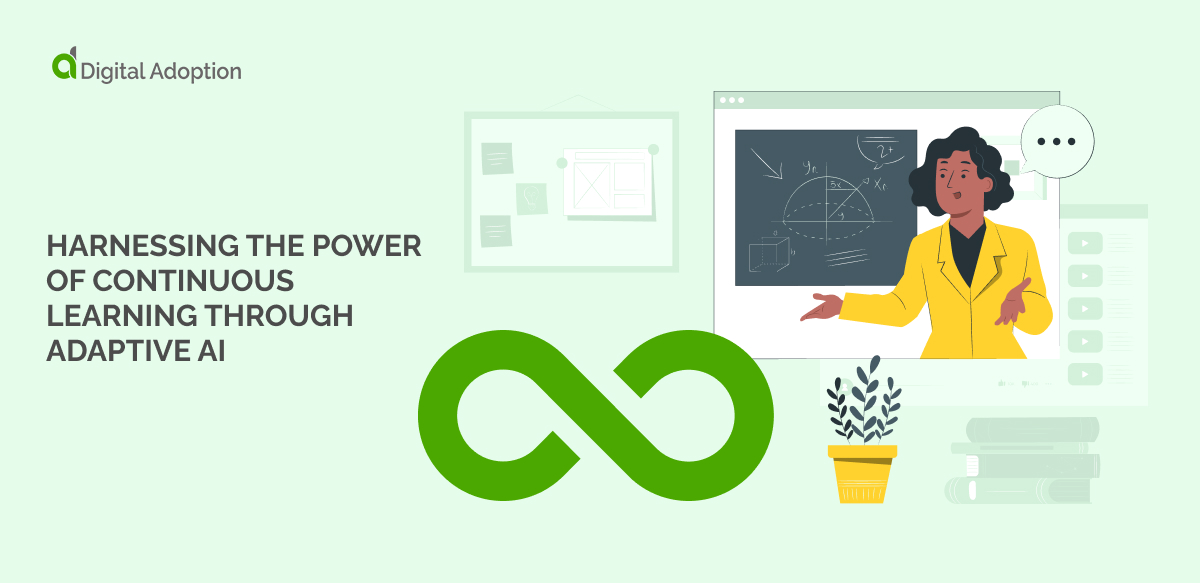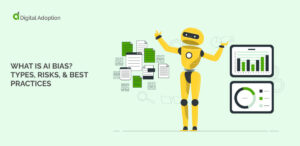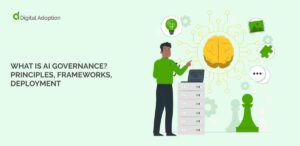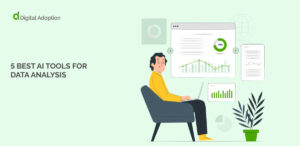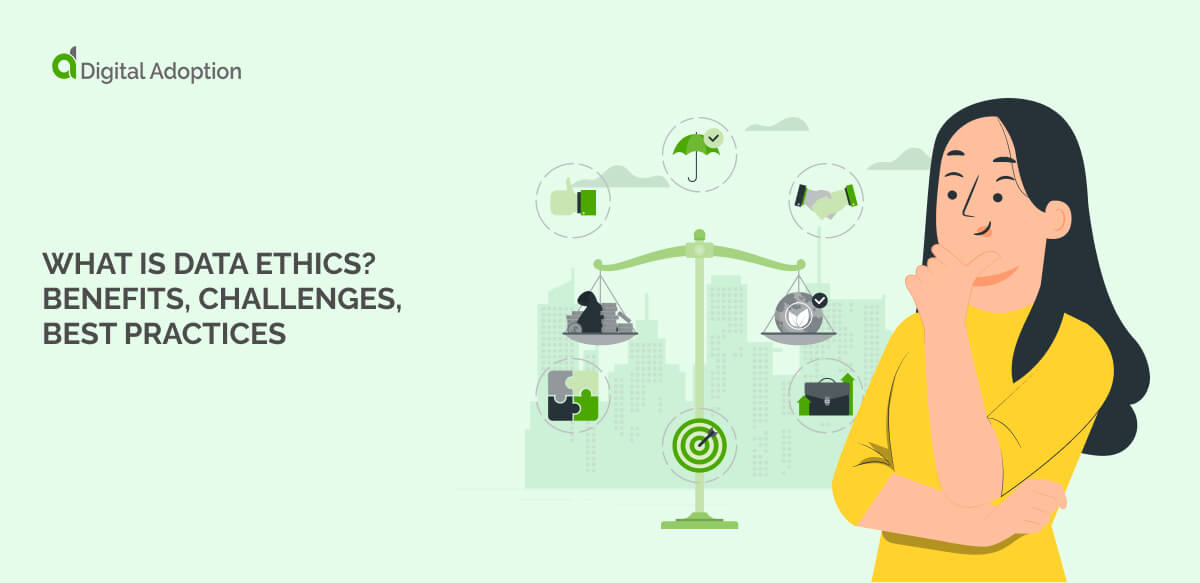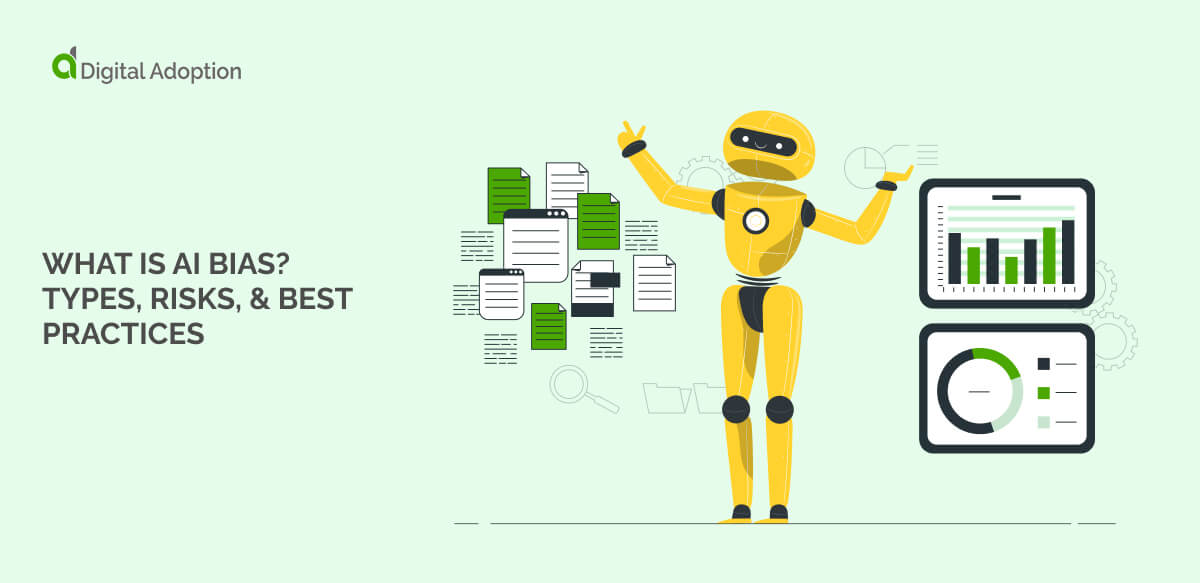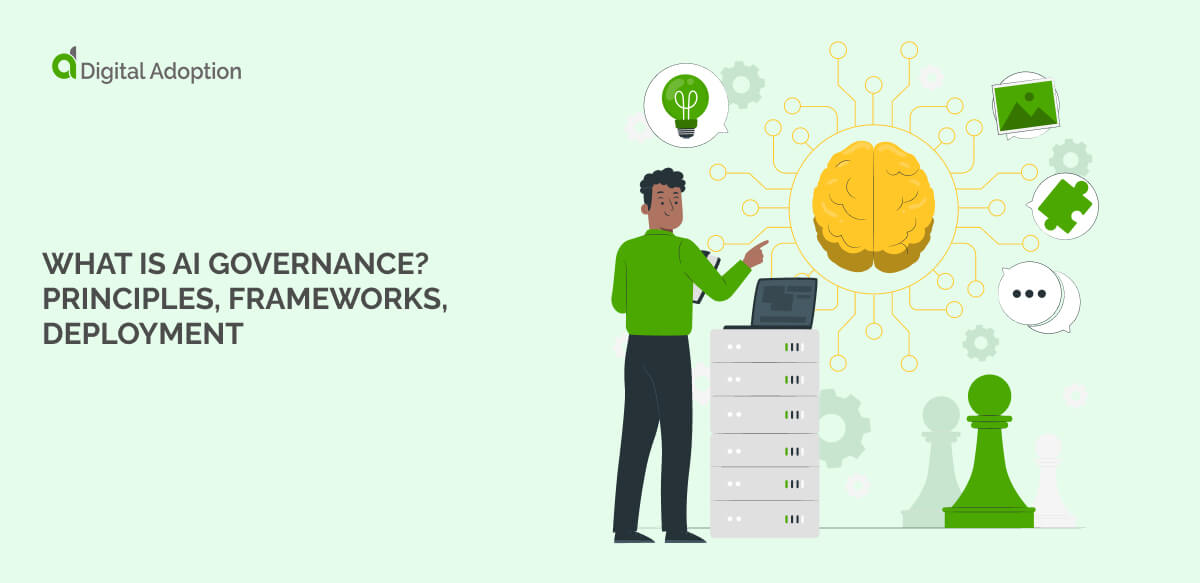As part of our Digital Adoption Trend Report, we are exploring the power of continuous learning through the power of adaptive AI.
AI has become a vital element of modern business, unlocking unprecedented opportunities for efficiency, productivity, and customer satisfaction. In contrast, Adaptive AI empowers machines to continuously learn and improve, like a human brain.
Digital transformation (DX) and digital adoption in business are two components becoming increasingly necessary for survival. As such, AI technology enables companies to optimize production processes and create more efficient operations with improved results.
Adaptive AI, however, is a new potent form of AI that leverages advanced algorithms and data-driven decision-making to respond to changing environments and learn independently.
It enables organizations to capture valuable insights from ever-evolving streams of customer data and emerging trends in their industry domains. It is essential for organizations today to understand the potential of AI and determine how best to capitalize on its value quickly.
In this article, we’ll discuss the key features of adaptive AI and its potential to revolutionize the world of intelligence and explore how it’s superior to traditional AI in learning, processing power, and decision-making.
We’ll also look at examples of how adaptive AI is being used today and what the future may hold for this groundbreaking technology.
- What is Adaptive AI?
- Adaptive AI vs. traditional AI
- The value of Adaptive AI
- Why should Adaptive AI matter to your business?
- The three tenets of Adaptive AI
- How Adaptive AI is accelerating business agility
- How is Adaptive AI optimizing data?
- Adaptive innovations & real-world applications
- Leveraging Adaptive AI for the future
What is Adaptive AI?
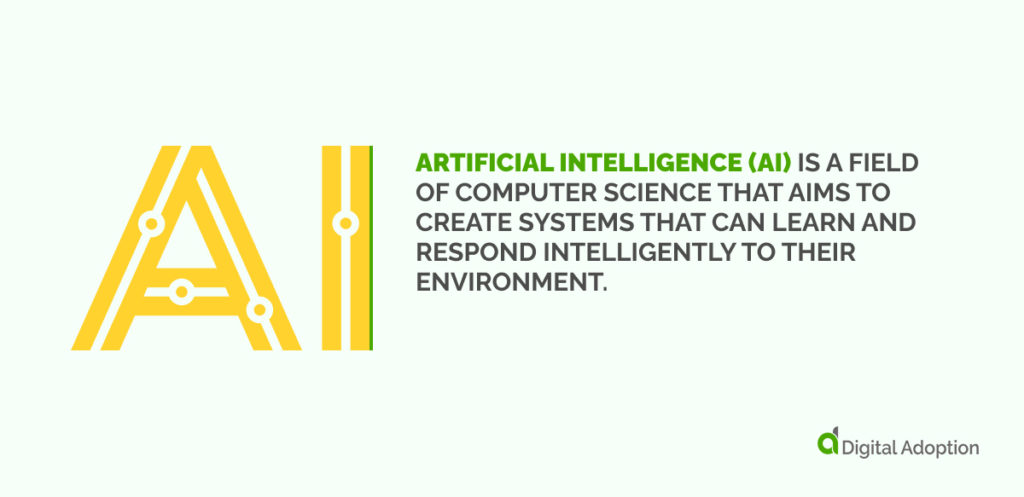
Artificial intelligence (AI) is a field of computer science that aims to create systems that can learn and respond intelligently to their environment.
Adaptive AI creates systems that get smarter over time based on new information. It uses artificial neural networks (ANN), which comprise layers of interconnected neurons. These neurons are trained using large data sets. This means that the ANN can figure things out for itself without needing help from a programmer or operator.
Gartner recognized Adaptive AI as one of the top technology trends of 2023. The research firm predicts that businesses leveraging this technology by 2026 will have an advantage over their competitors of up to 25%.
Adaptive AI vs. traditional AI
There are two kinds of AI. Traditional AI is when you use rules and data to figure things out. Adaptive AI is when you use a computer to learn from lots and lots of data.
Traditional and adaptive AI have advantages and drawbacks depending on the task. Conventional AI is more reliable and predictable but needs more flexibility when it comes to adapting quickly to changing data inputs. At the same time, adaptive AI provides more dynamic responses but may only sometimes be accurate due to its reliance on historic patterns in data sets.
Both forms of AI have great potential when applied correctly. They can provide robust solutions for many business needs depending on context – deciding which to adopt between the two usually depends upon available resources, time constraints, desired outcomes, etc.
The value of Adaptive AI
Adaptive AI allows organizations to quickly adjust and fine-tune their operating environment according to the latest data – making its potential value clear in a world where data-driven insights are becoming increasingly important.
Adaptive AI offers valuable opportunities to optimize processes and create new business models that drive breakthroughs in performance. Companies can use advanced and traditional machine learning (ML) algorithms to fine-tune their operations to meet specific goals. They can use real-time data-informed predictions to drive enhanced business decisions.
Moreover, businesses can reduce costs by intelligently automating critical operations and augmenting existing staff with intelligent systems while unlocking greater predictive accuracy across all areas of their operations.
In the longer term, adaptive AI will open up enormous possibilities for businesses to develop more sophisticated strategies and unlock further efficiencies.
Why should Adaptive AI matter to your business?
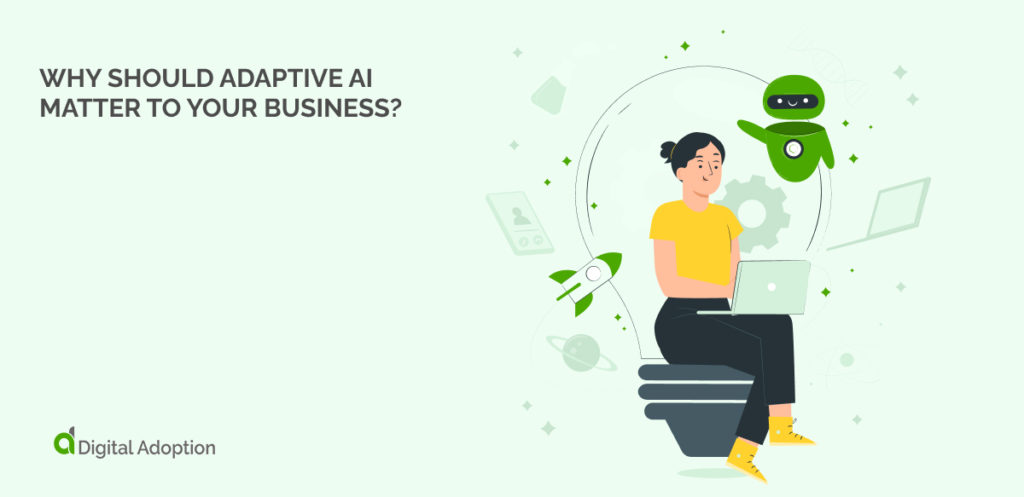
Adaptive AI is a powerful tool for enabling successful business operations today. The ability to quickly identify patterns from data and make predictions based on previous outcomes is invaluable for businesses of all sizes.
For example, adaptive AI can identify customer trends or segment target markets based on social media data, allowing businesses to understand their customers better and tailor their marketing strategies accordingly. Additionally, advanced predictive analytics tools powered by artificial intelligence can be invaluable in forecasting future outcomes and helping with long-term business planning.
As technology advances and businesses seek to drive productivity gains through automation and intelligent workflows, adaptive AI will become an indispensable tool for maintaining business longevity.
The three tenets of Adaptive AI
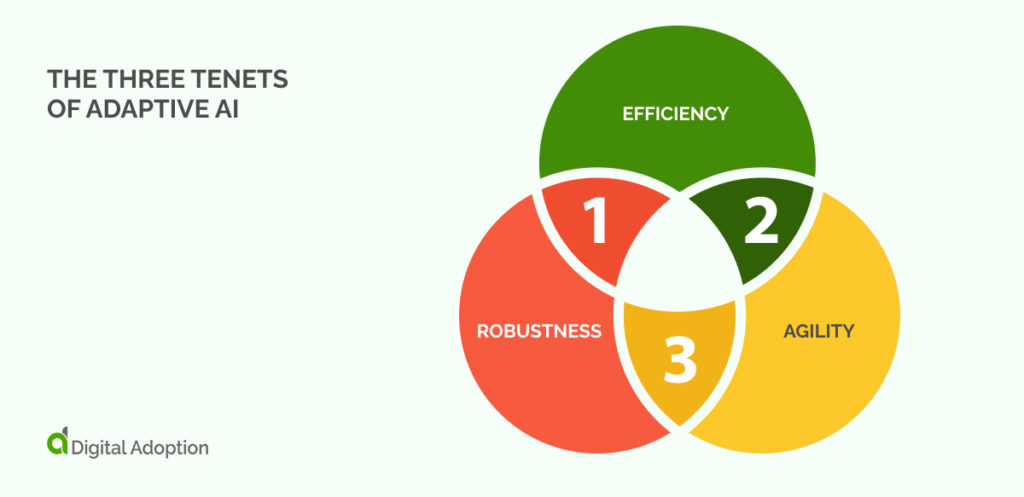
In 2023, organizations will be under immense pressure to change and adapt to survive. To do so, they must adopt an approach to AI characterized by three fundamental tenets:
- Robustness
- Efficiency
- Agility
Let’s explore these three tenets more closely.
Robustness
Robustness refers to the ability of an AI system to withstand changes in its environment and continue functioning effectively.
This is crucial for organizations that want to implement AI-powered solutions, as it ensures that the system can adapt as needed and continue providing value. A robust AI system should function correctly even when environmental changes occur. This is important for organizations because the system can continue working even as conditions around it change.
Efficiency
When organizations implement AI-powered solutions, they often look for an edge over their competitors, and an improvement in efficiency can provide just that. With AI-powered systems, it is possible to automate tasks and processes, thus freeing up valuable resources for more important activities.
AI-driven automation also increases production speeds by removing mundane data entry tasks, reducing overall cycle times. Businesses can create leaner operations with improved throughput by streamlining these processes and reducing manual labor.
Because AI systems use vast data sets to make decisions, they are often more accurate than manual methods. This improves the accuracy of decision-making while also saving time and money.
Agility
AI-driven solutions are essential for achieving agility because they can process large amounts of data and adjust algorithms accordingly.
For example, if a customer begins buying more luxury items instead of necessities, an AI-powered system could identify this shift and recommend related products and services. This dynamic response to changing customer needs is essential for staying ahead in an increasingly crowded market.
AI systems can also adjust their parameters without manual involvement or disruption, which gives companies greater flexibility when responding to sudden changes.
How Adaptive AI is accelerating business agility
Adaptive AI is ushering in a new era of business operations, increasing the agility and responsiveness of businesses in a way that has never been seen before. By uncovering patterns in data, Adaptive AI provides invaluable insights to organizations that allow them to leap on opportunities with immediacy, capitalize on emerging trends without hesitation, and fine-tune their strategies or services at an unparalleled speed.
Adaptive AI presents modern businesses with a toolkit to unlock opportunities that would typically be impossible to capture, helping them stay outmaneuver the competition and chart a successful course into a bright future.
Adaptive AI can also give modern businesses a greater sense of accountability, as the technology quickly flags up anomalies or errors that may have previously gone unnoticed. Adaptive AI allows companies to reduce risk, stay within compliance, and deliver more reliable results by keeping watch over operations and processes.
With the capacity to handle large volumes of data in seconds, this tool is invaluable for any organization seeking to maximize its performance and ensure the highest quality standards.
How is Adaptive AI optimizing data?
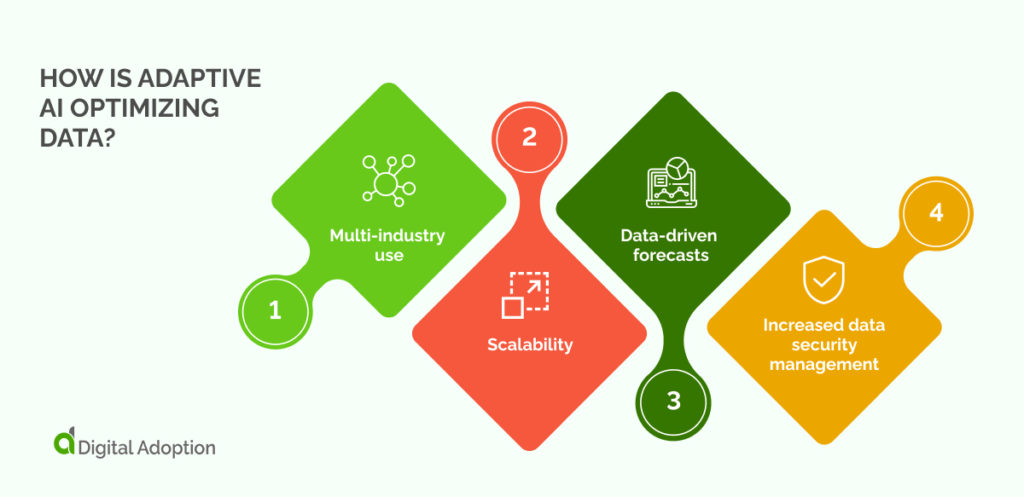
Adaptive AI has been revolutionizing how data is optimized. It is a process that not only monitors and records new changes to input and output values along with their related qualities but also considers the events that may affect market behavior in real-time, allowing various dynamic and sophisticated solutions.
Adaptive AI is optimizing data in these four scopes:
- Multi-industry use
- Scalability
- Data-driven forecasts
- Increased data security management
Multi-industry use
The multi-industry applications of this technology are particularly impressive, with Adaptive AI being used for healthcare diagnostics and predictive analysis tasks such as cancer detection, retail marketing automation and personalization, inventory management for manufacturing companies, and even autonomous driving cars.
Scalability
The scalability of Adaptive AI is also a significant advantage for businesses that need to keep up with constantly changing customer preferences or market trends. With its ability to quickly identify patterns and learn from them over time, adaptive AI models ensure that companies remain competitive by rapidly adapting their strategies according to the latest insights.
Data-driven forecasts
Data-driven forecasts are another benefit of adopting an adaptive approach to data analysis — with advanced ML techniques creating highly sophisticated predictive models, which can then be leveraged for forecasting purposes. This could range from predicting customer behavior in the short-term, or assessing macroeconomic factors in the long run.
Increased data security management
As hackers become more sophisticated in stealing sensitive information from businesses and individuals alike, Adaptive AI can provide a valuable tool in combating such threats through automated intrusion detection systems (IDS). With adaptive IDS solutions capable of dynamically adjusting parameters based on incoming data streams, these technologies can quickly flag suspicious activity without relying on manual labor or antiquated rule-based detection approaches.
Adaptive innovations & real-world applications
Adaptive AI is an incredible innovation that has the potential to revolutionize many industries and is already being used in a wide range of sectors.
- Healthcare
- Retail
- Car Manufacturing
Healthcare
Healthcare is one of the primary areas benefiting from adaptive AI technology. From improved diagnosis accuracy to faster patient care, advanced machine learning algorithms are helping medical professionals get better results with less effort than ever before.
In particular, deep learning techniques have been used for predictive analysis tasks like cancer detection and automatic image recognition applications such as CT scans. Additionally, adaptive AI can assist hospitals in optimizing scheduling and tracking equipment utilization rates more efficiently.
Retail
Retailers are also taking advantage of adaptive AI to gain the competitive upper hand. For example, e-commerce platforms can utilize AI models to personalize product recommendations based on customer preferences and past purchase patterns. This form of marketing automation allows retailers to target customers with highly relevant campaigns that are more likely to convert into sales.
Furthermore, through leveraging data-driven insights about customers’ purchase decisions at scale, retail businesses can now create highly effective strategies for inventory management and pricing optimization without having to spend countless hours manually processing raw transactional data points.
Car Manufacturing
Another vital sector where adaptive AI shines is car manufacturing. Automated robots controlled by machine learning agents have enabled car manufacturers worldwide to significantly reduce production costs while increasing reliability and precision in the assembly line process — something that was impossible using human labor alone.
Similarly, automakers are using advanced computer vision algorithms for autonomous driving technology, which could soon lead us into a future where vehicles drive themselves safely with minimal risk.
In short, the possibilities offered by Adaptive AI technology are practically unlimited; however, modern businesses benefit greatly from its groundbreaking capabilities across many different industries and sectors.
Leveraging Adaptive AI for the future
Adaptive AI presents an exciting future of innovation and real-world advancements. Autonomous vehicles, efficient medical diagnoses and treatments, improved customer experiences through retail automation tools, and robust cybersecurity measures are some ways this technology can enhance our lives.
Along with numerous advantages and opportunities, Adaptive AI also comes with its own challenges and risks. To make the most of this technology, it’s essential to ensure that all regulatory requirements are met and that potential negative outcomes are avoided or minimized. This means proper implementation and usage of adaptive AI requires careful planning and strategizing. It’s also important to consider privacy concerns, as the data collected by the system could pose a risk if not properly secured.
However, despite the challenges that come with this technology, the overall potential benefits far outweigh any downsides when done right. The key is to ensure that we use this powerful tool responsibly for our collective benefit – as only then can we unlock its true potential for innovating our world.

